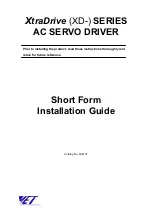
English
1-7
COMPLIANCE
A comprehensive guide to product compliance is available in the AC690 Product Manual.
Warning
– Where there is a conflict between EMC and safety requirements personnel safety shall always
take precedence.
Operation of this equipment requires detailed installation and operation instructions provided in the
installation manual intended for use on this product. This information is provided on line at
Caution
: This is a product of the restricted sales distribution class according to IEC 61800-3. It is designated
as “professional equipment” as defined in EN61000-3. Permission of the supply authority shall be obtained
before connection to the low voltage supply.
In a domestic environment this product may cause radio interference in which case supplementary mitigation
measures may be required.
This equipment contains electrostatic discharge (ESD) sensitive parts. Observe static control precautions
when handling, installing and servicing this product.
EMC Emissions
Radiated Emissions comply with EN61800-3 category C1, C2 and C3 when installed in accordance with
instructions in Chapter 4 refer to “mounting the unit”.
Conducted Emissions comply with EN61800-3 category C3 and C2 without external filter and category C1
when fitted with specified external filter.
Immunity complies with the requirement of EN61800-3, for equipment intended for use in the second
environment.
EMC Connections
For compliance with the EMC requirements, the “0V/signal ground” is to be separately earthed. When a
number of units are used in a system, these terminals should be connected together at a single, local
earthing point.
Control and signal connections should be made with screened cables, with the screen connected only at the
VSD end. However, if high frequency noise is still a problem, earth screen at the non VSD end via a 0.1
μ
F
capacitor.
Note: Connect the control and signal screens (at the VSD end) to the
VSD protective earth point, and not to the control board terminals.
Motor cables should have a 360
o
bond to ensure a low impedance
connection, as per the figure opposite;
Planning Cable Runs
Use the shortest possible motor cable lengths.
Use a single length of cable to a star junction point to feed multiple motors.
Keep electrically noisy and sensitive cables apart. If this is not possible parallel cable runs should be
separated by at least 0.25metres, for runs longer than 10 meters, separation should be increased
proportionally.
Sensitive cables should cross noisy cables at 90
o
angle.
Never run sensitive cables close or parallel to the motor, dc link and braking chopper circuit for any distance.
Never run supply, dc link or motor cables in the same bundle as the signal/control and feedback cables, even
if they are screened.
Ensure EMC filter input and output cables are separately routed and do not couple across the filter.
Example AC Fed Inverter shown.
Summary of Contents for 690+ series
Page 31: ......










































